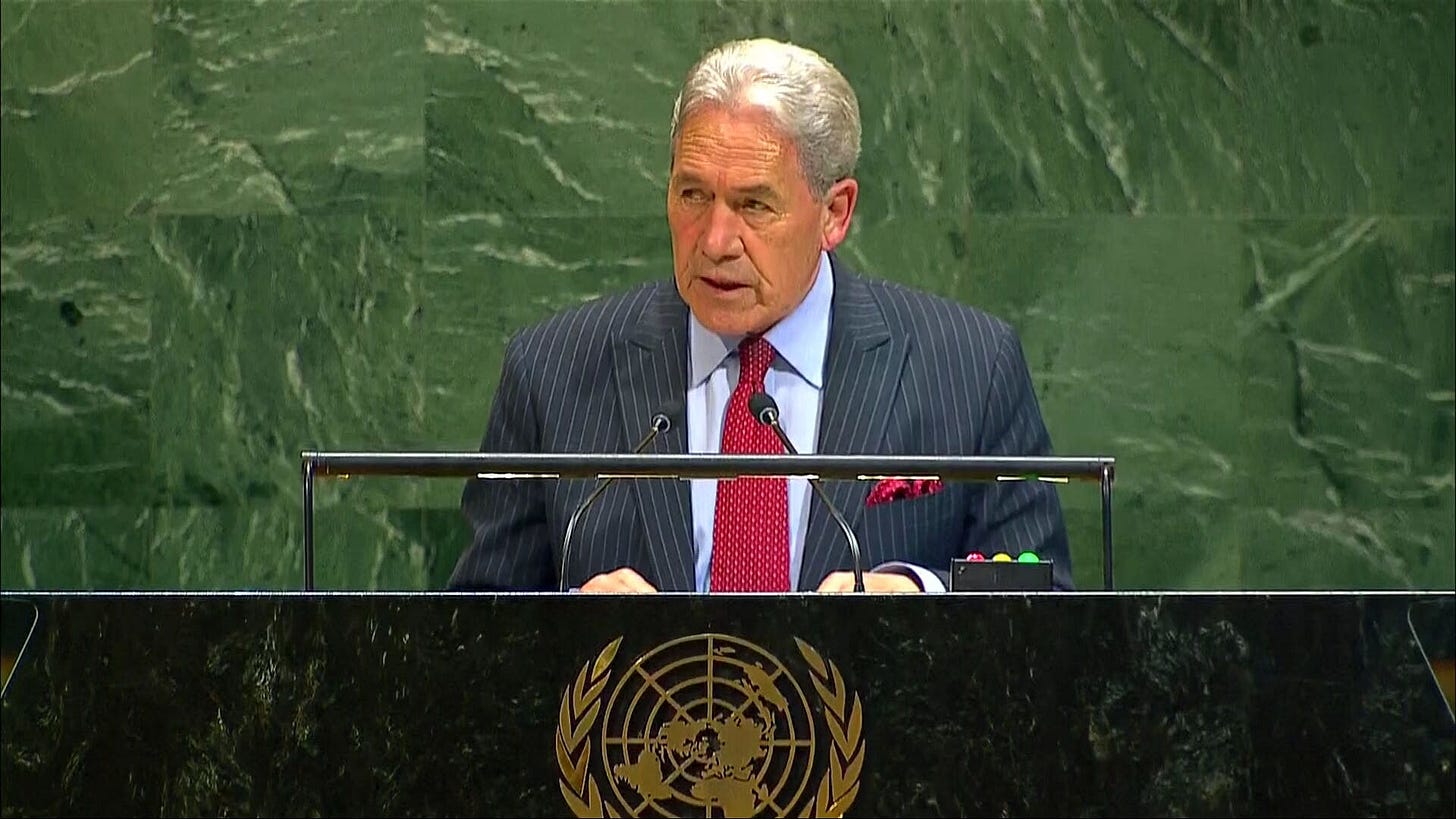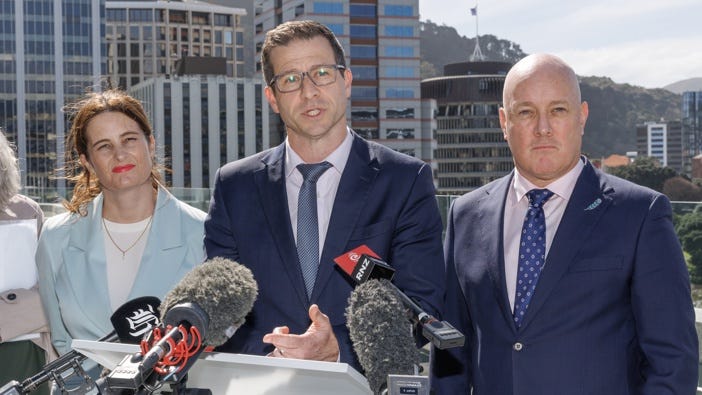“Lettergate” reveals the worst in Luxon and Hipkins
Christopher Luxon’s decision to send a letter to Labour leader Chris Hipkins, calling for bipartisan support for offshore gas exploration should have been a good one. It backfired however, because his media team are incapable of managing a basic embargo process and sent a copy of the letter to the New Zealand Herald who immediately contacted Hipkins for comment before he even knew of the letter’s existence. Hipkins refused to sign, accusing Luxon of grandstanding, and the leaked letter became the story, turning what could have been a moment of consensus into a messy political sideshow. Media were typically more interested in the letter than the future of New Zealand’s economy.

“Lettergate” captures the failings of both leaders. Hipkins continues to demonstrate that he is willing to hold the country hostage by placing his own political ambitions above New Zealand’s energy security. Luxon looked like a bad playwright trying to stage-manage a press stunt and weakened his claims of genuine bipartisan outreach. Meanwhile, no one wants to invest in a country plagued by energy insecurity and volatile costs of running a business.
Islamist terror attack in Manchester
On Yom Kippur (the holiest and most solemn day in the Jewish calendar), Jihad Al-Shamie, a 35-year-old British citizen born in Syria, drove a vehicle into pedestrians and then launched a stabbing attack outside the Heaton Park Hebrew Congregation Synagogue in Crumpsall, Manchester. The assault left two Jewish worshippers dead and at least three others seriously injured. Armed police shot and killed the assailant within minutes of the first emergency call. Immediately afterwards, pro-Palestine activists took to the streets in cities all over Britain celebrating and using the terror attack to continue their own political protesting.
Sadly, police have advised that one of the victims may have been fatally shot by officers responding to the attack. Authorities are treating the incident as a terror attack, with investigations now focusing on Al-Shamie’s motives and network (three additional suspects have been arrested).

Who gets the kids in the Toitū Te Tiriti / Te Pāti Māori divorce?
This week’s split between Toitū Te Tiriti and Te Pāti Māori marks a dramatic rupture within the activist-political alliance that helped drive much of the party’s grassroots energy in recent years. Toitū Te Tiriti announced it was cutting ties, citing “leadership dysfunction” and “values misalignment,” but there is speculation that it is equally plausible that Te Pāti Māori itself was the one pulling back seeking to distance its parliamentary brand from a movement that has spiralled beyond its control.
Toitū Te Tiriti has taken on an increasingly radical tone, blurring the line between legitimate dissent and open defiance of the state. That perception was only amplified by Black Power life member Denis O’Reilly, who commented that the Government’s gang patch ban has inadvertently pushed gang members to unite behind Toitū Te Tiriti. Against that backdrop, Te Pāti Māori may have concluded that the risks of association now outweigh the revolutionary romance.
The real question now is ‘who gets the kids in the divorce?’ Toitū Te Tiriti brought the numbers, the activists, the organisers, the street presence, while Te Pāti Māori held the political legitimacy and parliamentary platform. Many of the movement’s most visible campaigners and social media operators’ loyalties have long been intertwined with the both movement and party. The split will force everyone in that ecosystem to pick a side: do they stay loyal to the political project seeking influence within the system, or do they follow the more confrontational, extra-parliamentary path Toitū Te Tiriti seems determined to take? Read more here.
New Zealand says “not yet” to statehood for Palestine
Via Winston Peters speaking to the United Nations, New Zealand announced that we will not yet recognise Palestine as a sovereign state. However, Foreign Affairs Minister Peters reiterated that “recognition is a matter of when, not if.” Peters pointed to Hamas’s control over territory and the absence of a clear post-conflict political roadmap as reasons to delay. He warned that jumping to recognition now could harden positions on both sides and complicate efforts toward ceasefire and peace negotiations. I wrote more about it here.

Trump’s plan for peace
Donald Trump has rolled out a 20-point Gaza peace plan meant to end the Israel–Hamas war. It outlines ceasefire, mass hostage exchanges, sweeping demilitarisation, and a technocratic transitional administration under international oversight. The scheme is bold in scale: it envisions dismantling Hamas’s military infrastructure, forbidding any future political or military role for the group, and handing governance temporarily to a neutral, apolitical Palestinian body supervised by a new “Board of Peace” (which Trump himself would help lead). Central to the plan is the return of all hostages within 72 hours of acceptance, and a release of Palestinian prisoners in return. Trump has also issued a public ultimatum: Hamas must accept the plan by Sunday at 6 p.m. Washington time or face what he has threatened will be “all hell” unleashed. Israel’s Benjamin Netanyahu has given conditional backing, but has made it clear that Israel will “finish the job” if Hamas does not accept. Philip Crump wrote a great summary here.
The NZ Media Council shows how compromised it is again
The Media Council’s ruled against RNZ over its coverage of the teenager who died of starvation while in state care is a double standard clearly driven by gender and trans ideology. By upholding a complaint on balance and fairness from a story that sought to expose systemic failure, and how a young person died starving in emergency accommodation, the Council has effectively penalised journalism for telling difficult truths. RNZ, in its response, rightly argues that contrasting perspectives emerged only after publication; expecting a newsroom to retroactively “balance” first hand testimony with yet-to-be unearthed angles is a fool’s errand.
What is deeply troubling is the implicit message: media outlets are under threat of censure for earnest reporting on topics that the chattering classes have determined are sacred cows. If the Council is about accountability, it should be demanding more courage from newsrooms, not punishing them for pushing boundaries. RNZ’s commitment to reviewing its rainbow guidelines is a ridiculous concession to bullies but the bigger fight is for editorial independence and the space to hold power and systems to account without being gagged by activists within the system. Read RNZ’s response to the ruling.
Government announced changes to “earthquake prone” building standards
The Government’s newly announced overhaul of the earthquake-prone building regime promises to upend how we think about urban risk and blight. Under Minister Chris Penk’s proposed changes, the rigid New Building Standard (NBS) percentage thresholds would be replaced by what ministers are calling a “proportionate, risk-based EPB system”, one that focuses enforcement and cost on the most dangerous buildings rather than applying the same yardstick to all.
The revamp will see 55% of currently registered quake-prone buildings (around 2,900 structures) removed from the regime entirely, while 1,440 would face softer remediation rules, 840 would require no work, and only about 80 buildings would still be mandated to undergo full retrofits. The government projects that the new system will save more than $8 billion otherwise spent on demolition and remediation.
In combining a sharper focus on life-safety risk with large-scale deregistration of buildings, the Government is betting it can unlock dead capital in inner cities, reduce regulatory drag, and clear the way for renewal. If the ambition is matched by execution, this could mark a turning point in how we balance earthquake resilience with urban vitality.

Library workers’ pay-equity success
Auckland Council has awarded about 800 library workers a pay rise (backdated to 1 September), at a cost of roughly NZ$8.16 million. The move comes after sweeping changes to pay equity laws (via the Equal Pay Amendment Act) saw many female-dominated claims dropped under urgency.
The outcome for Auckland’s library workers suggests that the Government’s controversial overhaul of pay-equity laws hasn’t been the catastrophe critics foretold. Despite the scrapping of dozens of centralised claims, employers are still able, and willing, to deliver fairer pay outcomes when the case stacks up. Auckland Council’s decision to lift wages shows that responsibility for pay-equity no longer sits exclusively with Wellington. Instead, it’s now squarely on the shoulders of employers to assess, justify, and act. Far from shutting the door on progress, the reform may have forced a more direct, evidence-based approach, one that encourages organisations to own their pay practices rather than rely on government-driven settlements.
Thugs’ Veto: Jewish candidate dropped for being Jewish
A disturbing story out of the local election trail this week highlights how intimidation is corroding democratic participation. A local-body ticket has dropped its Jewish candidate, Karin Horen, after an alleged (and unsubstantiated) wave of threats, citing serious concerns for their safety and the wellbeing of campaign volunteers. The decision underscores an alarming climate in which candidates from minority backgrounds are being targeted for abuse linked to international conflicts rather than local issues. While the ticket’s organisers said they acted out of genuine concern, the fact that threats can drive someone out of civic life is a damning indictment on the state of political discourse. It also raises uncomfortable questions about whether local authorities and police are adequately prepared to protect free participation in democracy amid rising extremism and imported hate.

In short - other stuff that happened:
- The UN has urged New Zealand to reduce its prison population and strengthen oversight of detention facilities, demonstrating the global body’s increasing ideological entrenchment in the politics of prison abolishment and centring offenders rather than victims.
- The government says it is rolling out a safer online visa payments system, introducing 3D Secure authentication to better protect applicants’ financial information and reduce fraud in visa processing.
- Cabinet has agreed to replace the Holidays Act with a new Employment Leave Act, introducing hours-based accrual from day one, simplifying leave rules, and increasing casual employees’ leave compensation.
- Labour’s Rachel Brooking and Green Party co-leader Chloe Swarbrick were treated to a lobbyist junket in London. The Insurance Council of New Zealand flew them in business class to London to talk about the role of insurance in a climate change-impacted world. Former Labour Party Minister Kris Faafoi is the CEO of ICNZ Kris Faafoi.
- Kainga Ora sold the Dixon Street Flats to iwi for $1.04 million who then sold the property for $3.04 million to a private developer 20 days later.
- Crown Law refuses to say if Dentons lawyer Linda Clark provided legal advice to Jacinda Ardern, Grant Robertson, Chris Hipkins and Dr Ayesha Verrall. Read more.
- The Government has launched a new Defence Industry Strategy, overhauling procurement rules and creating a $100–300 million fund to build local defence technology capacity as part of a wider plan to lift defence spending by $9 billion and move toward 2% of GDP within eight years.
- New Zealand and Australia have jointly relaunched the UN Handbook 2025–26, reaffirming shared commitments to multilateralism.
- Pro-Palestine protesters are outside Winston Peters’ house after calls on social media to “show solidarity” with the three New Zealanders taken into custody by Israeli authorities as part of the Global Sumud Flotilla.
Ani O'Brien comes from a digital marketing background, she has been heavily involved in women's rights advocacy and is a founding council member of the Free Speech Union. This article was originally published on Ani's Substack Site and is published here with kind permission.


2 comments:
Did the UN urge Maori to stop committing their heinous crimes that sometimes puts them in jail ?
No they just told them it was not their fault, rather it was the fault of them colonists.
Post a Comment
Thank you for joining the discussion. Breaking Views welcomes respectful contributions that enrich the debate. Please ensure your comments are not defamatory, derogatory or disruptive. We appreciate your cooperation.